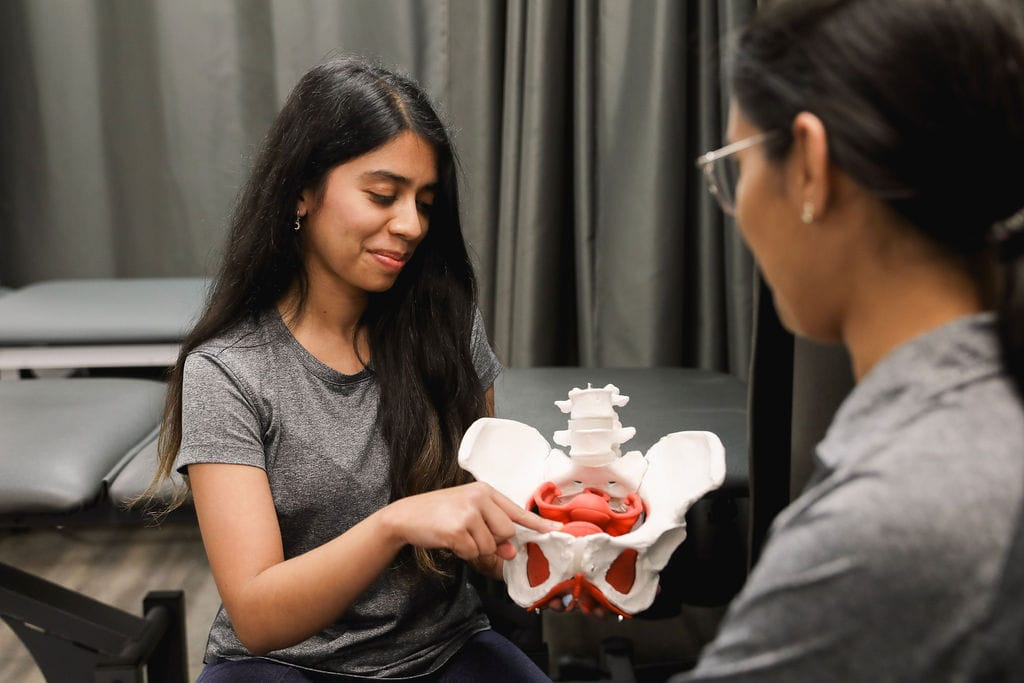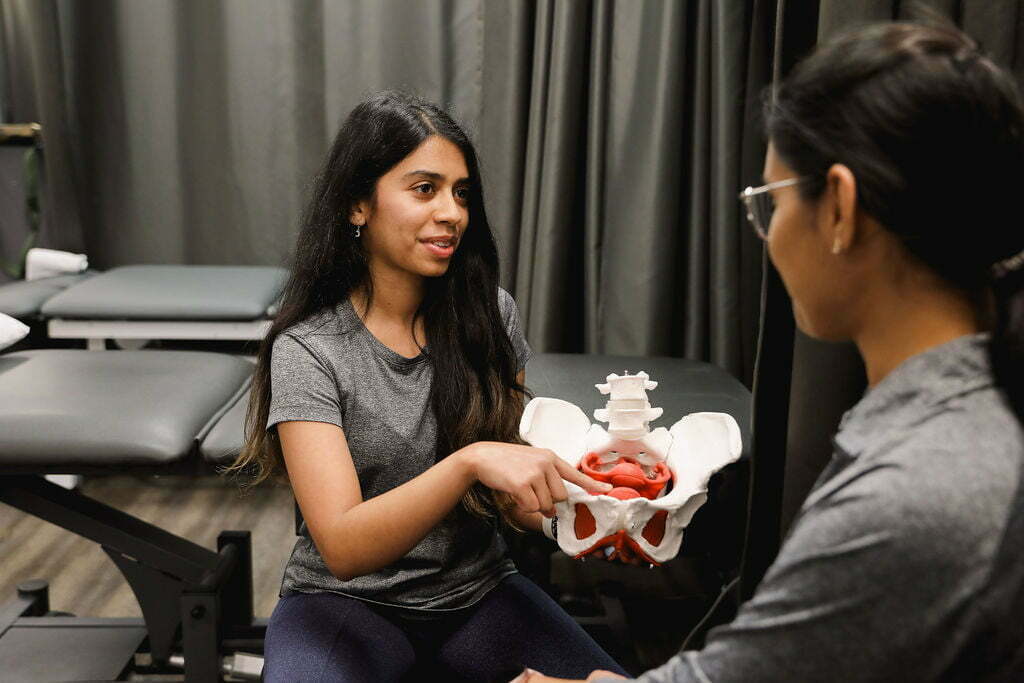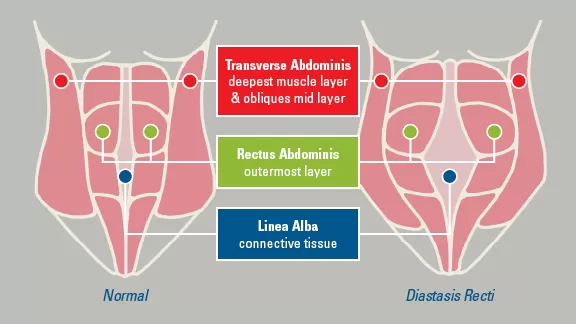Pelvic Floor Physiotherapy refers to a specific and advanced field within physiotherapy that deals with Pelvic Floor Dysfunction. Pelvic Floor Dysfunction can impact people of any age or gender and the term describes several conditions that may affect the urinary, reproductive, digestive, sexual, and/or stability systems in the pelvis.
Pelvic Health Physiotherapists have post-graduate training in pelvic health and can resolve many pelvic floor issues in people of all genders and ages.
What type of conditions can Pelvic Floor Physiotherapy help women with?

Pelvic Health physiotherapists at our clinics can help women with the following:
- Pelvic floor and abdominal weakness
- Bladder and bowel problems
- Pelvic pain (endometriosis, bowel, bladder pain)
- Pelvic organ prolapse (POP)
- Sexual dysfunction, vaginismus, painful intercourse
- Prenatal and postnatal care
- Diastasis Recti
- Labour and delivery prep
Can a pelvic health physiotherapist help men?

Pelvic Health physiotherapists at our clinics can help men with the following:
- Pelvic pain
- Bladder and bowel control problems
- Erectile dysfunction
- Pre and post-prostatectomy
Can your pelvic health physiotherapists help transgender individuals?
Yes, our pelvic health physiotherapists can certainly help transgender individuals.
- Surgical preparation and recovery post-surgery
- Pelvic pain – Endometriosis or PCOS
- Intimacy pain, difficulty with penetration
- Pregnancy and postnatal care for Trans-parents
Pelvic Floor Assessment – what does it entail?
Your first appointment will last about an hour. Your pelvic health physiotherapist will discuss your medical history, do a thorough pelvic health assessment and propose a detailed individualized treatment plan to achieve your pelvic health goals. The assessment may include an internal examination, with your consent, of course, depending on your condition.
Triangle Physiotherapy and our pelvic health team are passionate about supporting our transgender and intersex community.
What should I bring to my appointment? What should I wear?
Make sure you have filled out the Health Questionnaire sent to you by our booking team. Bring any physician or specialist referrals to test results you may have. Please wear comfortable clothing, there are no specific requirements.
How many sessions will I need?
After your assessment, your physiotherapist will prepare a treatment plan for you and be able to indicate how many appointments you may need to achieve your pelvic health goals.
Can I attend my appointment if I have my period?
Your pelvic health physiotherapist can treat you while you have your period, as long as you are comfortable with it.
How do I book an appointment to see a pelvic health physiotherapist at Triangle Physiotherapy?
Triangle Physiotherapy has pelvic health physiotherapists at the following locations:
- Etobicoke Pelvic Health – Triangle Physiotherapy Etobicoke
- Mississauga Pelvic Health – Triangle Physiotherapy Mississauga, Triangle Physiotherapy Erin Mills
- North York Pelvic Health – Triangle Physiotherapy North York
- Toronto Pelvic Health – Triangle Physiotherapy King West, Triangle Physiotherapy Queens Quay, Triangle Physiotherapy Lawrence Park
- Oakville Pelvic Health – Triangle Physiotherapy Oakville
Pelvic floor physiotherapy is essential for managing pelvic health issues such as incontinence, pelvic pain, and postpartum recovery. If you are seeking expert physiotherapy services to improve your pelvic health, there are clinics in physiotherapy Etobicoke, Oakville, North York, Toronto, Lawrence Park, Queens Quay, Erin Mills, Mississauga, and Liberty Village. These locations offer specialized care and personalized treatment plans to help you achieve optimal pelvic health and well-being.
Pelvic organ prolapse (POP) is a condition in which there is a descent of the pelvic organs into or through the vaginal or anal canal. This can present as:
- a visible bulge in the above openings,
- pressure felt in the pelvic area,
- incomplete emptying of bladder or bowels,
- discomfort during intercourse.
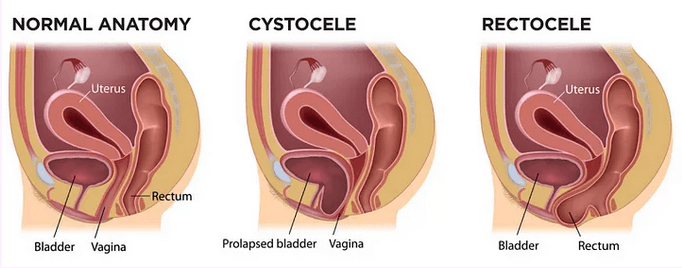
The main reason for prolapse is increased pressure on the pelvic floor due to:
– Chronic constipation
– Bearing children
– Pelvic floor weakness due to hormonal imbalance
Conservative non-surgical management is the first line of treatment for POP.
Your pelvic floor physiotherapist will assess the severity of your symptoms, the strength of your pelvic floor and your ability to manage pressure and stresses to your pelvic floor. Treatment would include strengthening exercises for the core and pelvic floor muscles and coordination techniques for all the inner unit muscles.
The types of pelvic organ prolapse are:
- Anterior Wall Prolapse
- Posterior Wall Prolapse
- Rectal Prolapse
Depending on the grade and type of prolapse, you might be a candidate for a pessary fitting.
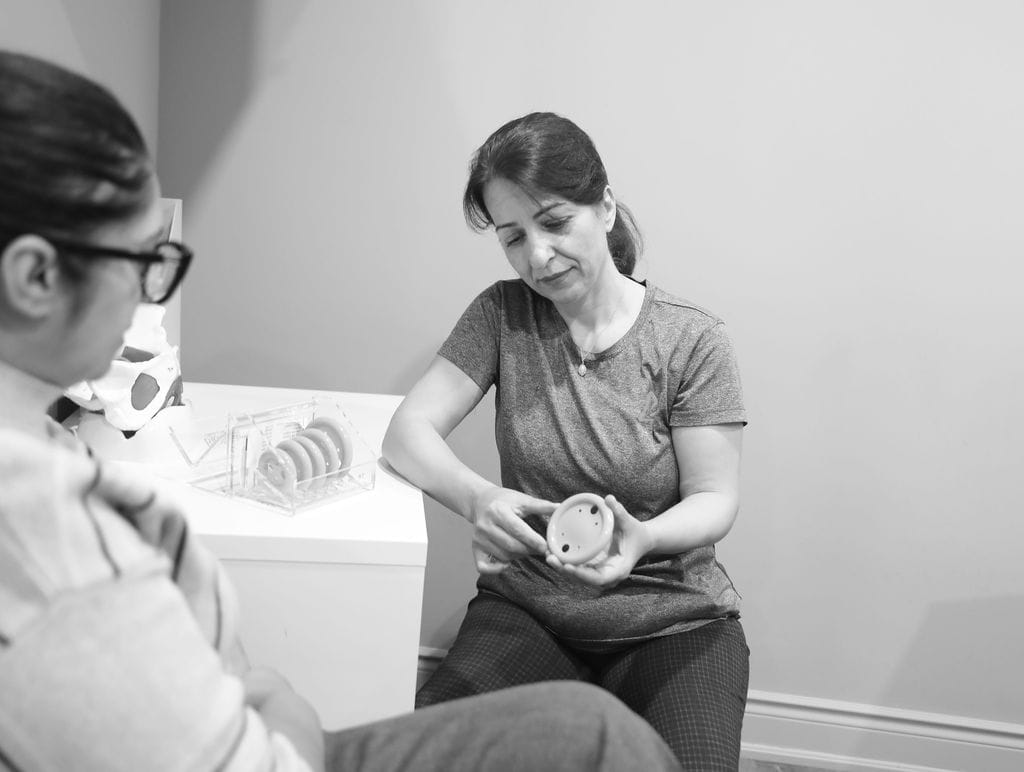
A pessary is a medical grade silicone device that is inserted into the vaginal canal in order to support the vaginal walls. If you are a candidate for a pessary, it must be fitted for you by a trained professional such as gynaecologists, nurses that have a certification in fittings or pelvic health physios that are specialized to do so.
We currently have 3 practitioners at Triangle Physiotherapy who are certified in pessary fittings.
Your pelvic floor deserves more than just kegels. Speak to a pelvic health physiotherapist today to get started!
Where can I find a pelvic health physiotherapist near me?
We have 8 locations with pelvic health physiotherapists to help you.
- Pelvic Health Physiotherapy Etobicoke – Triangle Physiotherapy Etobicoke
- Oakville Pelvic Health – Triangle Physiotherapy Oakville
- Pelvic Health Physiotherapy North York – Triangle Physiotherapy North York
- Mississauga Pelvic Health – Triangle Physiotherapy Mississauga
- Downtown Pelvic Health – Triangle Physiotherapy King West
- Uptown Toronto Pelvic Health – Triangle Physiotherapy Lawrence Park
- Pelvic Physiotherapy Downtown Toronto – Triangle Physiotherapy Queens Quay
- Mississauga Pelvic Health – Triangle Physiotherapy Erin Mills
Written by Roshni Ravi, Pelvic Health Physiotherapist
Stress incontinence is a type of urinary incontinence that occurs with physical activity or exertion. This can be from coughing, sneezing, laughing or exercise e.g. jumping. All of these actions can put pressure on the bladder thereby causing leaks. The pelvic floor is important in preventing this leaks and supporting the bladder.
Pelvic floor exercises such as a kegel are commonly recommended for leaks. However, a lot of time the pelvic floor is actually tight rather than weak. Reverse Kegels involve relaxing the pelvic floor muscles, allowing them to lengthen and release tension. This helps to prevent over-tightening and over-activity of the pelvic floor muscles, which can contribute to stress incontinence.

Hypertonic pelvic floor
Hypertonic pelvic floor refers to a condition where the pelvic floor muscles are in a state of excessive and persistent contraction. This can lead to a number of symptoms, including pelvic pain, urinary and fecal incontinence, and sexual dysfunction.
Hypertonic pelvic floor can be caused by a number of factors, including pregnancy, childbirth, surgery, chronic constipation, and chronic pelvic pain. It can also be a result of excessive or improper use of pelvic floor muscle exercises, such as Kegels.
Treatment for Hypertonic pelvic floor
Treatment for hypertonic pelvic floor typically involves a combination of physical therapy and relaxation techniques. Physical therapy may include manual therapy to release muscle tension, as well as exercises to stretch and relax the pelvic floor muscles. Relaxation techniques, such as deep breathing, progressive muscle relaxation, and biofeedback, can also be helpful in reducing muscle tension.
If you’re experiencing leaks, reach out to a pelvic floor therapist for an assessment or discovery call!
FAQ’s about Stress Incontinence
Q: What is stress incontinence?
A: Stress incontinence is a type of urinary incontinence that occurs when pressure is placed on the bladder, such as during coughing, sneezing, laughing, or exercising, and causes involuntary urine leakage.
Q: What causes stress incontinence?
A: Stress incontinence is typically caused by weakened pelvic floor muscles and/or a weakened urethral sphincter, which can occur due to aging, pregnancy and childbirth, menopause, obesity, chronic coughing, or certain medical conditions.
Q: Who is at risk for developing stress incontinence?
A: Women are more likely to develop stress incontinence than men, especially those who have gone through pregnancy and childbirth, menopause, or pelvic surgery. Other risk factors include obesity, chronic coughing, and certain medical conditions that affect the bladder or nervous system.
Q: How is stress incontinence diagnosed?
A: Stress incontinence can be diagnosed through a physical exam, a urine test, and other tests such as a bladder diary or urodynamic testing.
Q: What are the treatment options for stress incontinence?
A: Treatment options for stress incontinence may include:
- pelvic floor exercises,
- behavioral therapies,
- medications,
- medical devices such as pessaries, and in some cases,
- surgery.
Q: Can stress incontinence be prevented?
A: While stress incontinence may not be completely preventable, there are steps you can take to reduce your risk. Maintaining a healthy weight, doing regular pelvic floor exercises, and avoiding smoking and excessive caffeine consumption are some of these.
Q: Is stress incontinence a normal part of aging?
A: While stress incontinence is more common in older adults, it is not a normal part of aging and should not be ignored or accepted as an inevitable consequence of getting older. Treatment options are available, and seeking help from a healthcare provider is important.
Managing stress incontinence effectively involves a combination of pelvic floor exercises, lifestyle changes, and sometimes physiotherapy. For those seeking professional physiotherapy services to help manage incontinence and improve pelvic health, there are clinics in physiotherapy Etobicoke, Oakville, North York, Toronto, Lawrence Park, Queens Quay, Erin Mills, Mississauga, and Liberty Village. These clinics offer expert care and personalized treatment plans to help you achieve a leak-free life and enhanced quality of life.
Pelvic Floor Disorders are a common occurrence but the treatments available for pelvic floor dysfunction are not widely known. Pelvic Floor Physiotherapy has been proven to help with Pelvic Floor Dysfunction and this is where we come in! Triangle Physiotherapy has state-of-the-art facilities with private rooms for pelvic health treatments. Your comfort is our priority while addressing this sensitive issue.
Pelvic Floor Muscles & Pelvic Floor Dysfunction
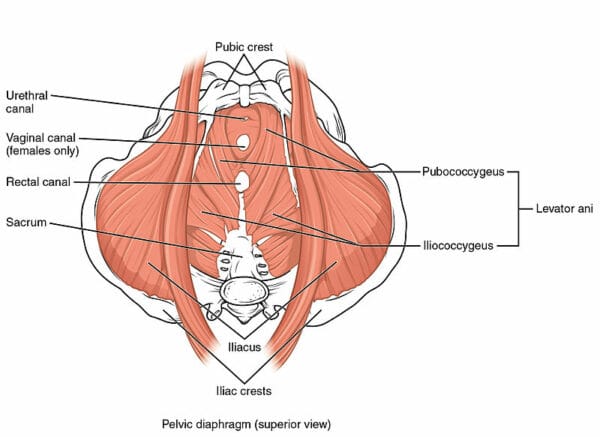
The pelvic floor is made up of layers of muscles and other tissues. These muscles are stretched end to end from the tailbone to the pubic bone. Sometimes these muscles tend to lose their normal control and cause pelvic floor dysfunction.
Also read, Physiotherapy Clinic in Etobicoke
What causes Pelvic Floor Dysfunction?
Pelvic Floor Dysfunction can be caused by any of the following two conditions:
- Hypotonicity – When the pelvic floor muscles become weak and are unable to continue proper functioning, they cause stress incontinence, urge incontinence and pelvic organ prolapse (when a pelvic organ drops from its normal position).
- Hypertonicity – When the pelvic floor muscles become tight, leading to urinary and fecal urgency, urge incontinence, chronic pelvic pain, etc., the condition is known as pelvic floor dysfunction.
Also read, Physiotherapy Treatment in Oakville
What Do We Treat?
We treat a variety of Pelvic Floor Dysfunctions such as:
Conditions in Males
- Post-Prostatectomy Incontinence
- Pelvic Pain
- Pelvic Floor Dysfunction
Conditions in Females
- Pelvic Organ Prolapse
- Vaginal Pain Syndrome
- Urinary Conditions
- Pelvic Floor Dysfunction
Musculoskeletal Conditions
- Lower Back Pain
- Groin/Pubic Pain
- Sacroiliac Pain
- Piriformis Syndrome
Also read, Physiotherapy Mississauga
Rectal & Bowel Conditions
- Constipation
If you suffer from any of the above-mentioned conditions, you should consider booking an appointment at any one of our 6 clinics in Etobicoke, Oakville, Mississauga, North York, Toronto (King Street) and Toronto (Yonge Street).
How can Pelvic Physiotherapy help me?
Pelvic Floor Physiotherapy can help you with:
- Pelvic exercises to gain bladder and bowel control.
- Exercises to regain normal muscle strength and tone.
- Manual Therapy techniques to help you locate & work your weak pelvic floor muscles.
- Tips on good postures.
- Identification of other problem areas that might need physiotherapy treatment.
- Appropriate lifestyle guidance and recommended changes.
Pelvic Physiotherapy is an effective treatment for solving Pelvic Floor Dysfunction and at Triangle Physiotherapy, our Pelvic Physiotherapists will help you get back to doing the things you love.
Pelvic floor physiotherapy is an essential treatment for those experiencing pelvic discomfort, incontinence, or postpartum recovery challenges. If you are looking for professional physiotherapy services, there are clinics in physiotherapy Etobicoke, Oakville, North York, Toronto, Lawrence Park, Queens Quay, Erin Mills, Mississauga, and Liberty Village that offer specialized care and customized treatment plans to help improve pelvic health and overall quality of life.
What is incontinence?
Incontinence can be a fairly sensitive or embarrassing subject to those who suffer from it. Incontinence is the involuntary loss of urine or feces from the bladder and bowel. But know this, incontinence is an ACCIDENT, it is something that is uncontrollable and can happen to any expecting mother.
Urinary incontinence affects around 10-13 million men and women, and it is twice as common in women as in men. Anthony Atala, MD, said, “I would say virtually all pregnant women experience some type of incontinence”. Incontinence should not rule your pregnancy or your life.

What does pregnancy have to do with incontinence?
Pregnancy can interfere with the normal way your urethra relaxes and contracts. You are able to urinate when the muscles around your urethra relax, allowing urine to pass through your bladder and out of your body. After urination, the muscles around your urethra contract, holding off urine flow until your body is ready to urinate again. Hormone changes during pregnancy and the additional pressure on the bladder from your uterus can cause stress incontinence. Mothers who are experiencing stress incontinence may urinate whilst sneezing, walking, coughing, laughing, running, and during exercise. Women who have a family history of incontinence, gain more weight than recommended during pregnancy, and are over the age of 35 are at higher risk of experiencing incontinence.
How do I avoid incontinence during pregnancy?
There are numerous ways to avoid pregnancy incontinence, along with visiting a pelvic health physiotherapist, to avoid leakage.
- Schedule your bathroom breaks. Try to make it to the toilet at least every two hours, as when pregnant, women urinate more frequently.
- If you think your bathroom visits are proper, try practicing kegel exercises. Kegels help strengthen the pelvic floor. Practicing a kegel is the same as stopping the flow of urine within your urethra. Contract your muscles to the count of ten and then release. Repeat exercises ten to twenty times in a row two to three times a day. The average time to see results is four to eight weeks of regular practice.
- Watching your weight while carrying has a significant effect on developing incontinence. Women who gain more weight during pregnancy are more likely to experience incontinence. Combining these factors with your pelvic physiotherapist will lower your risk of developing incontinence during your pregnancy, allowing your experience to be worry-free.
If you are still unsure or worried about the risk of incontinence during your pregnancy, contact a pelvic floor physiotherapist at Triangle Physiotherapy. Triangle Physiotherapy has eight convenient locations: Etobicoke, Oakville, Mississauga, North York, Toronto, and King West. At Triangle Physiotherapy, our team is compromised of professionals who love what they do. Triangle staff will ensure that you will have a safe and comfortable pregnancy while in their care, and will help get your pregnancy back on track and in your hands.
Click HERE to book an appointment with a physiotherapist at one of our eight locations.
- Physiotherapy Etobicoke – Triangle Physiotherapy Etobicoke
- Oakville Physiotherapy Clinic – Triangle Physiotherapy Oakville
- Physiotherapy North York – Triangle Physiotherapy North York
- Mississauga Physiotherapy Clinics – Triangle Physiotherapy Mississauga
- Downtown Physiotherapy Clinics – Triangle Physiotherapy King West
- Uptown Physiotherapy Clinics – Triangle Physiotherapy Lawrence Park
- Physiotherapy Clinic Downtown Toronto – Triangle Physiotherapy Queens Quay
- Physiotherapy Clinics Mississauga – Triangle Physiotherapy Erin Mills
Incontinence during pregnancy can be challenging, but physiotherapy can help manage symptoms and improve pelvic floor strength. If you’re looking for specialized physiotherapy services to support incontinence management, consider clinics in physiotherapy Etobicoke, Oakville, North York, Toronto, Lawrence Park, Queens Quay, Erin Mills, Mississauga, and Liberty Village. These clinics offer expert care and personalized treatment plans to help you stay comfortable and healthy throughout your pregnancy journey.
A Diastasis Recti Abdominus is a separation in the 6-pack muscle, the rectus abdominis.
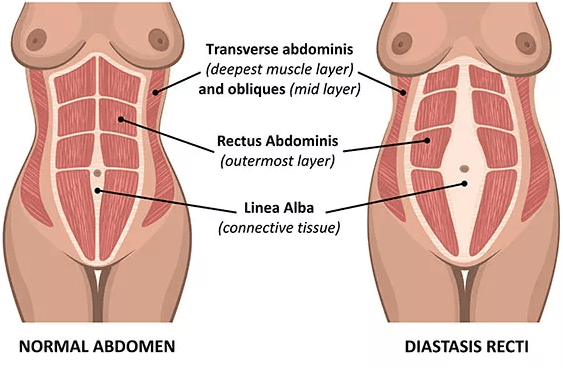
How does it occur?
It most often occurs during pregnancy. Sometimes it will spontaneously correct following birth, but it does not always.
It can also occur with overstretch of abdominal musculature.
Why is it a problem?
There is no pain with this condition.
However, the abdominal wall and the core will become weak. Your abdominals work with your pelvic floor, so a separation of your rectus abdominis muscles can make your pelvic floor less efficient and may result in prolapse and incontinence.Your abdominals also work with your lower back musculature, therefore it can lead to lower back pain.
How do I know if I have a Rectus Diastasis?
If you lift your head while lying on your back and the center of your belly protrudes out, you may have a rectus diastasis. It is measured by the number of fingers you can fit between the muscle when lying on your back and lifting your head. Normal is 1/2 a finger above and below the belly button, and one finger at the belly button.
How do I treat it?
If the abdominal separation is greater than 4 fingers, an abdominal binder is recommended. If you use an abdominal binder, it should be from your hip bones to your rib cage, you need to keep the binder on 24/7. You can only take the binder off when you do your correction exercise below, or when you take a shower. You should keep it on at bedtime.
To get your pelvic health assessed, schedule a consultation with a pelvic floor physiotherapist at Triangle Physiotherapy!
Written by: Kamand Zendeganidoost, Registered Physiotherapist
Managing rectus diastasis effectively often involves specialized physiotherapy to strengthen the core and improve abdominal function. If you are seeking professional physiotherapy services for abdominal separation, consider visiting clinics in physiotherapy Etobicoke, Oakville, North York, Toronto, Lawrence Park, Queens Quay, Erin Mills, Mississauga, and Liberty Village. These clinics provide expert care and personalized treatment plans to help you restore core stability and strength.

